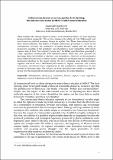Files in this item
Globalization, democratization, and the Arab uprising : the international factor in MENA's failed democratization
Item metadata
| dc.contributor.author | Hinnebusch, Raymond | |
| dc.date.accessioned | 2016-09-24T23:34:06Z | |
| dc.date.available | 2016-09-24T23:34:06Z | |
| dc.date.issued | 2015 | |
| dc.identifier | 162704499 | |
| dc.identifier | 3d439e7e-51e7-4cad-a135-068cdbf4c5b8 | |
| dc.identifier | 84929027320 | |
| dc.identifier | 000353453000008 | |
| dc.identifier.citation | Hinnebusch , R 2015 , ' Globalization, democratization, and the Arab uprising : the international factor in MENA's failed democratization ' , Democratization , vol. 22 , no. 2 , pp. 335-357 . https://doi.org/10.1080/13510347.2015.1010814 | en |
| dc.identifier.issn | 1351-0347 | |
| dc.identifier.other | ORCID: /0000-0001-5800-6606/work/60630160 | |
| dc.identifier.uri | https://hdl.handle.net/10023/9547 | |
| dc.description.abstract | What explains the almost negative impact of international factors on post-Uprising democratization prospects? This article compares the utility of rival “diffusionist” and neo-Gramscian political economy frames to explain this. Three international factors deter democratization. The failure of Western democracy promotion is rooted in the contradiction between the dominance of global finance capital and the norm of democratic equality; in the periphery, neo-liberalism is most compatible with hybrid regimes and, at best, “low intensity democracy.” In MENA, neo-liberalism generated a crony capitalism incompatible with democratization; while this also sparked the uprisings, these have failed to address class inequalities. Moreover at the normative level, MENA hosts the most credible counter-hegemonic ideologies; the brief peaking of democratic ideology in the region during the early uprisings soon declined amidst regional discourse wars. Non-democrats—coercive regime remnants and radical charismatic movements--were empowered by the competitive interference of rival powers in Uprising states. The collapse of many Uprising states amidst a struggle for power over the region left an environment uncongenial to democratization. | |
| dc.format.extent | 389358 | |
| dc.language.iso | eng | |
| dc.relation.ispartof | Democratization | en |
| dc.rights | Copyright 2015 Taylor & Francis. This is an Accepted Manuscript of an article published by Taylor & Francis in Democratization on 24/03/2015, available online: http://wwww.tandfonline.com/10.1080/13510347.2015.1010814 | en |
| dc.subject | Globalization | en |
| dc.subject | Democracy promotion | en |
| dc.subject | Finance capital | en |
| dc.subject | Crony capitalism | en |
| dc.subject | Hegemony | en |
| dc.subject | Counter-hegemony | en |
| dc.subject | Arab Uprising | en |
| dc.subject | JZ International relations | en |
| dc.subject | General Social Sciences | en |
| dc.subject | BDC | en |
| dc.subject | R2C | en |
| dc.subject.lcc | JZ | en |
| dc.title | Globalization, democratization, and the Arab uprising : the international factor in MENA's failed democratization | en |
| dc.type | Journal article | en |
| dc.contributor.institution | University of St Andrews.School of International Relations | en |
| dc.identifier.doi | 10.1080/13510347.2015.1010814 | |
| dc.description.status | Peer reviewed | en |
| dc.date.embargoedUntil | 2016-09-24 |
This item appears in the following Collection(s)
Items in the St Andrews Research Repository are protected by copyright, with all rights reserved, unless otherwise indicated.

